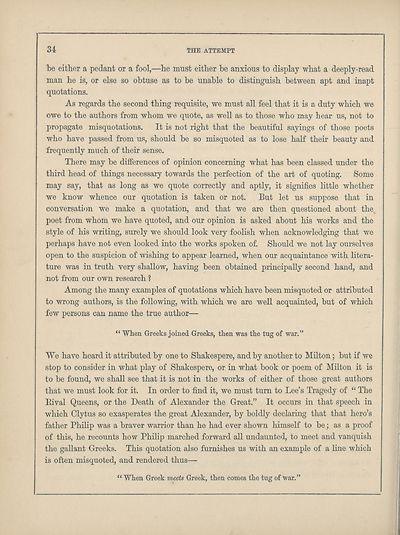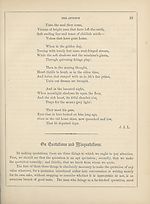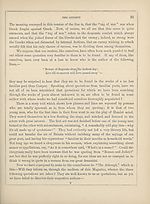Attempt > Volume 1 and Select writings
(46) Page 34
Download files
Complete book:
Individual page:
Thumbnail gallery: Grid view | List view

34
THE ATTEMPT
be either a pedant or a fool,—he must either be anxious to display what a deeply-read
man he is, or else so obtuse as to be unable to distinguish between apt and inapt
quotations.
As regards the second thing requisite, we must all feel that it is a duty which we
owe to the authors from whom we quote, as well as to those who may hear us, not to
propagate misquotations. It is not right that the beautiful sayings of those poets
who have passed from us, should be so misquoted as to lose half their beauty and
frequently much of their sense.
There may be differences of opinion concerning what has been classed under the
third head of things necessary towards the perfection of the art of quoting. Some
may say, that as long as we quote correctly and aptly, it signifies little whether
we know whence our quotation is taken or not. But let us suppose that in
conversation we make a quotation, and that we are then questioned about the
poet from whom we have quoted, and our opinion is asked about his works and the
style of his writing, surely we should look very foolish when acknowledging that we
perhaps have not even looked into the works spoken of. Should we not lay ourselves
open to the suspicion of wishing to appear learned, when our acquaintance with litera¬
ture was in truth very shallow, having been obtained principally second hand, and
not from our own research 1
Among the many examples of quotations which have been misquoted or attributed
to wrong authors, is the following, with which we are well acquainted, but of which
few persons can name the true author—
“ When Greeks joined Greeks, then was the tug of war.”
We have heard it attributed by one to Shakespere, and by another to Milton; but if we
stop to consider in what play of Shakespere, or in what book or poem of Milton it is
to be found, we shall see that it is not in the works of either of those great authors
that we must look for it. In order to find it, we must turn to Lee’s Tragedy of “ The
Rival Queens, or the Death of Alexander the Great.” It occurs in that speech in
which Clytus so exasperates the great Alexander, by boldly declaring that that hero’s
father Philip was a braver warrior than he had ever shown himself to be; as a proof
of this, he recounts how Philip marched forward all undaunted, to meet and vanquish
the gallant Greeks. This quotation also furnishes us with an example of a line which
is often misquoted, and rendered thus—
“ When Greek meets Greek, then comes the tug of war.”
THE ATTEMPT
be either a pedant or a fool,—he must either be anxious to display what a deeply-read
man he is, or else so obtuse as to be unable to distinguish between apt and inapt
quotations.
As regards the second thing requisite, we must all feel that it is a duty which we
owe to the authors from whom we quote, as well as to those who may hear us, not to
propagate misquotations. It is not right that the beautiful sayings of those poets
who have passed from us, should be so misquoted as to lose half their beauty and
frequently much of their sense.
There may be differences of opinion concerning what has been classed under the
third head of things necessary towards the perfection of the art of quoting. Some
may say, that as long as we quote correctly and aptly, it signifies little whether
we know whence our quotation is taken or not. But let us suppose that in
conversation we make a quotation, and that we are then questioned about the
poet from whom we have quoted, and our opinion is asked about his works and the
style of his writing, surely we should look very foolish when acknowledging that we
perhaps have not even looked into the works spoken of. Should we not lay ourselves
open to the suspicion of wishing to appear learned, when our acquaintance with litera¬
ture was in truth very shallow, having been obtained principally second hand, and
not from our own research 1
Among the many examples of quotations which have been misquoted or attributed
to wrong authors, is the following, with which we are well acquainted, but of which
few persons can name the true author—
“ When Greeks joined Greeks, then was the tug of war.”
We have heard it attributed by one to Shakespere, and by another to Milton; but if we
stop to consider in what play of Shakespere, or in what book or poem of Milton it is
to be found, we shall see that it is not in the works of either of those great authors
that we must look for it. In order to find it, we must turn to Lee’s Tragedy of “ The
Rival Queens, or the Death of Alexander the Great.” It occurs in that speech in
which Clytus so exasperates the great Alexander, by boldly declaring that that hero’s
father Philip was a braver warrior than he had ever shown himself to be; as a proof
of this, he recounts how Philip marched forward all undaunted, to meet and vanquish
the gallant Greeks. This quotation also furnishes us with an example of a line which
is often misquoted, and rendered thus—
“ When Greek meets Greek, then comes the tug of war.”
Set display mode to: Large image | Transcription
Images and transcriptions on this page, including medium image downloads, may be used under the Creative Commons Attribution 4.0 International Licence unless otherwise stated. ![]()
| Ladies' Edinburgh Debating Society publications > Attempt > Volume 1 and Select writings > (46) Page 34 |
|---|
| Permanent URL | https://digital.nls.uk/109865506 |
|---|
| Attribution and copyright: |
|
|---|

